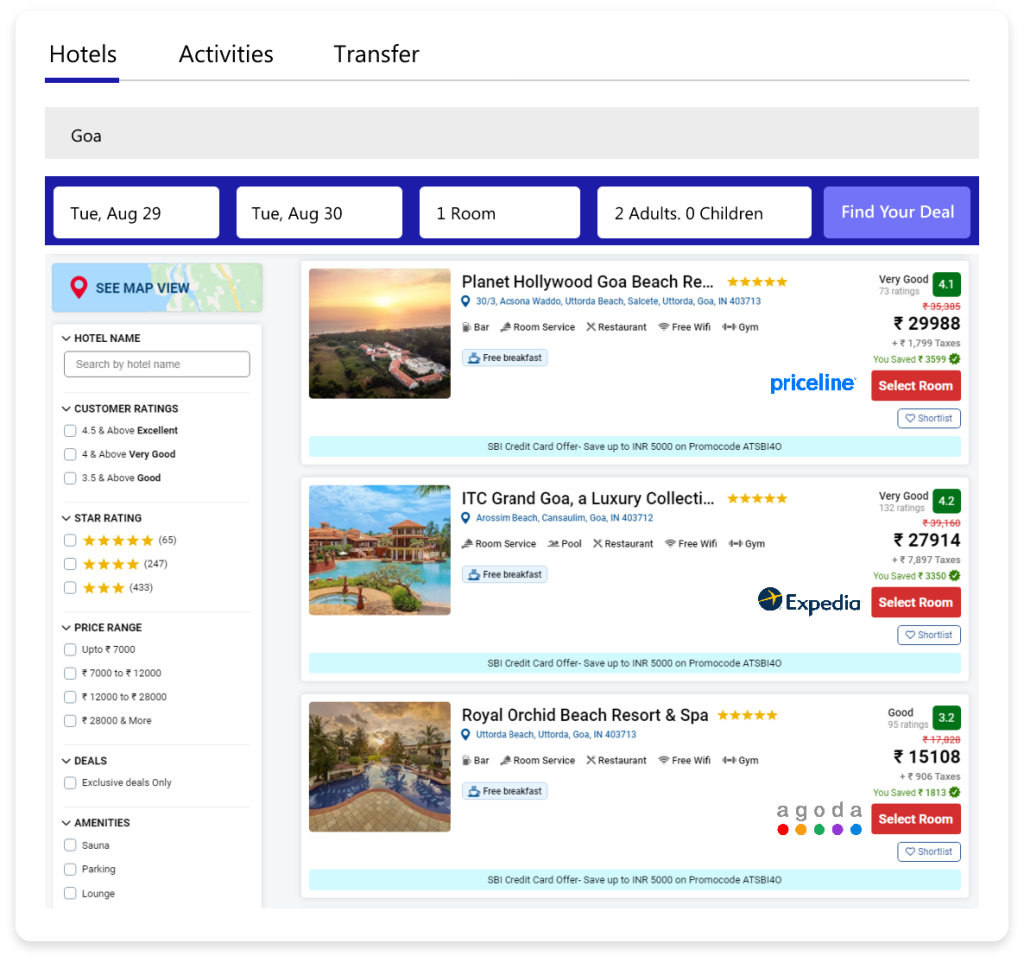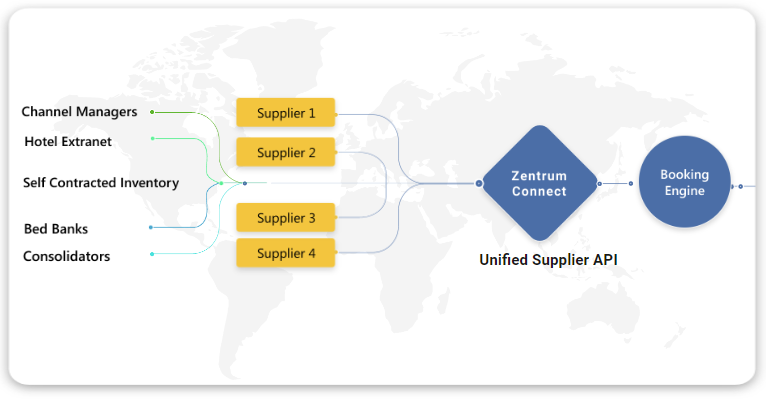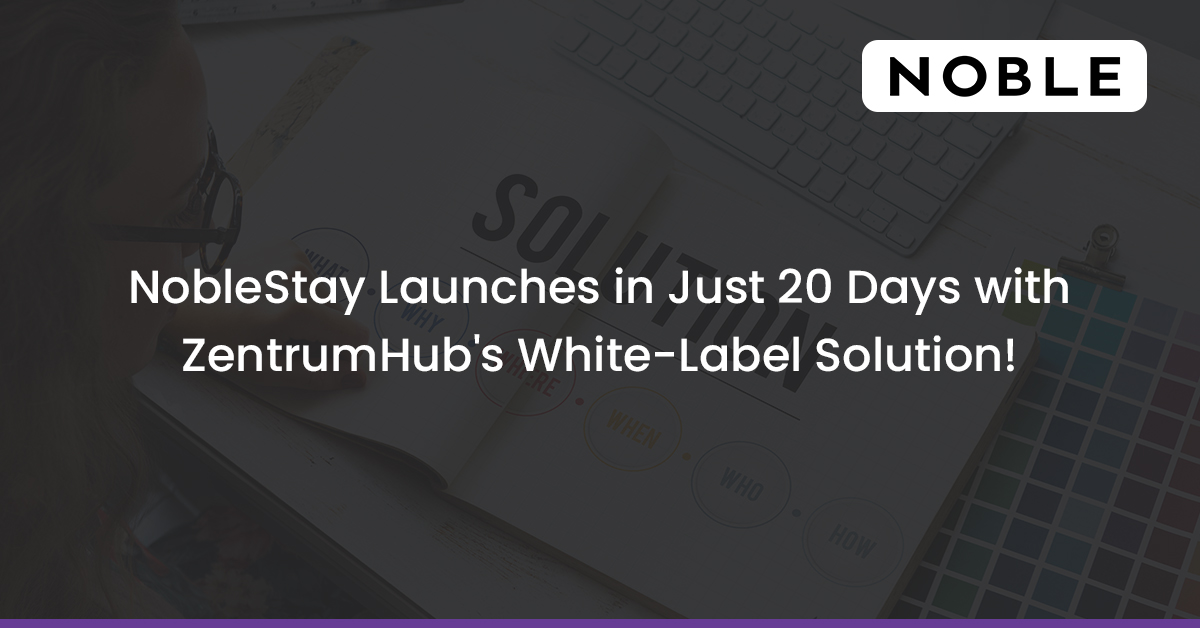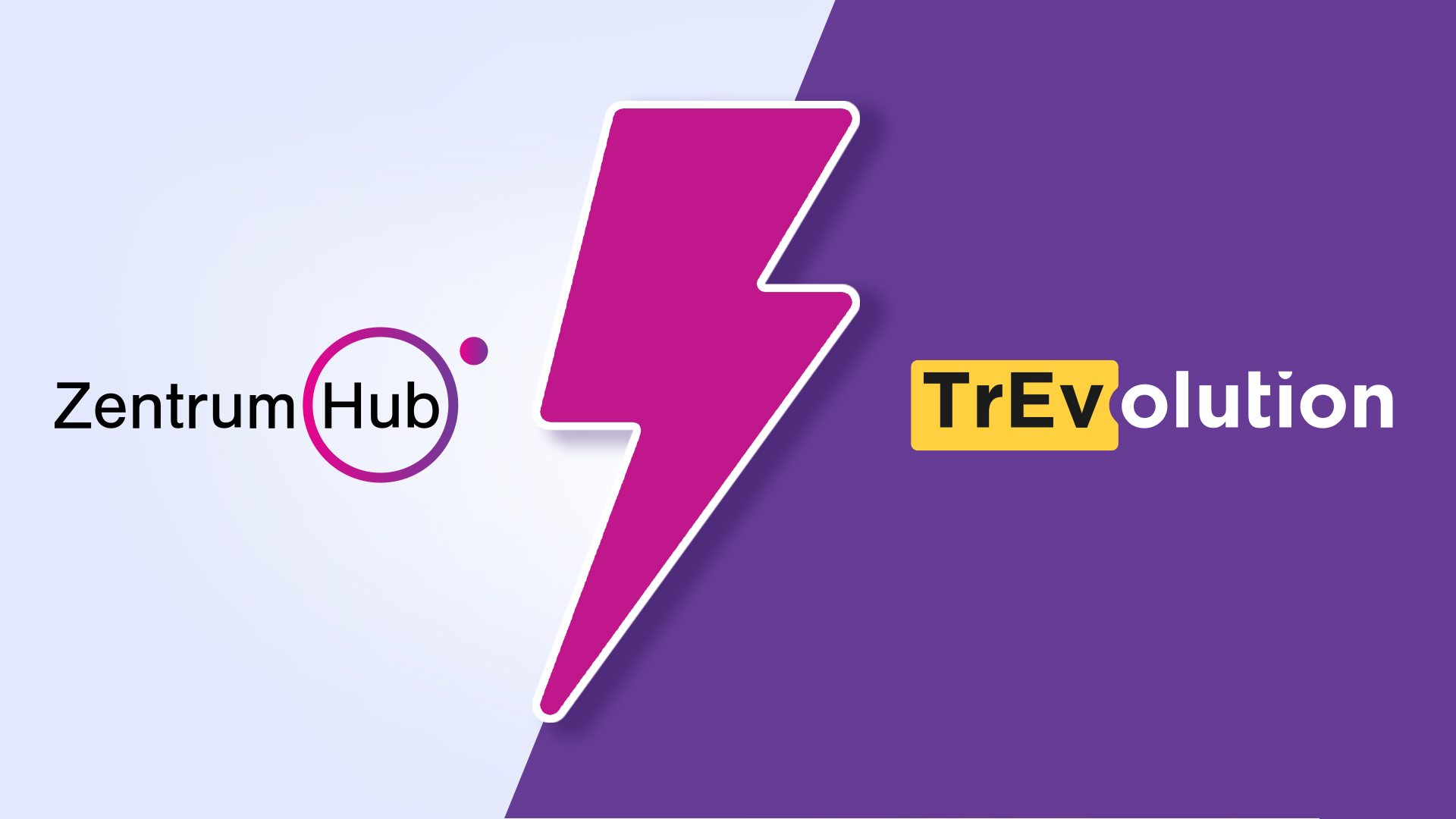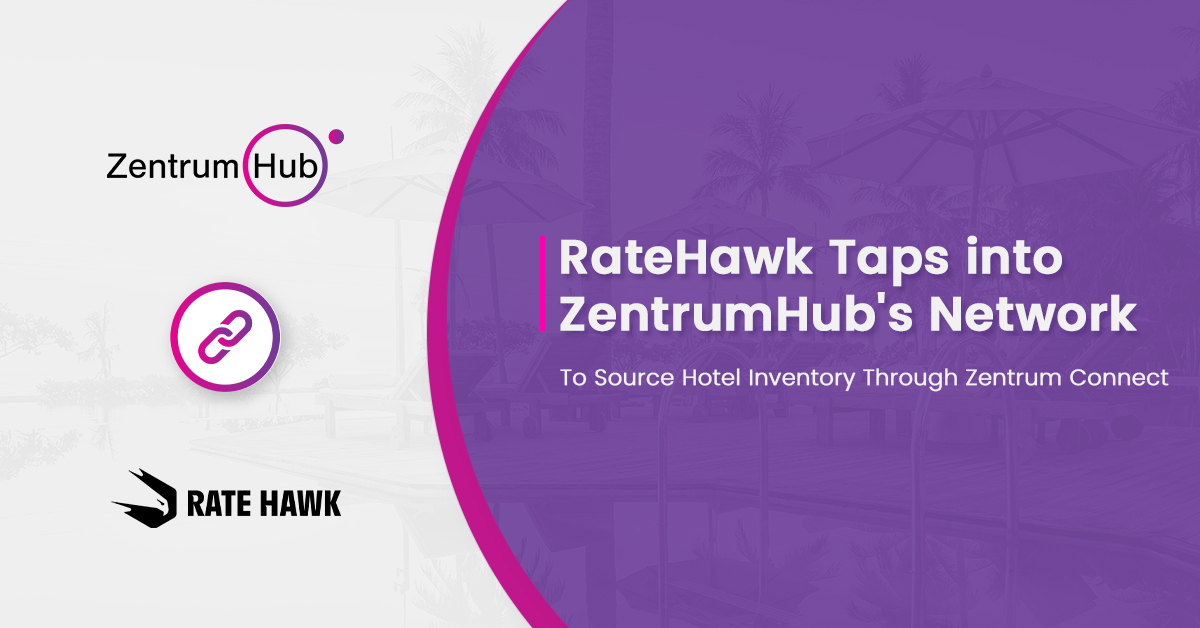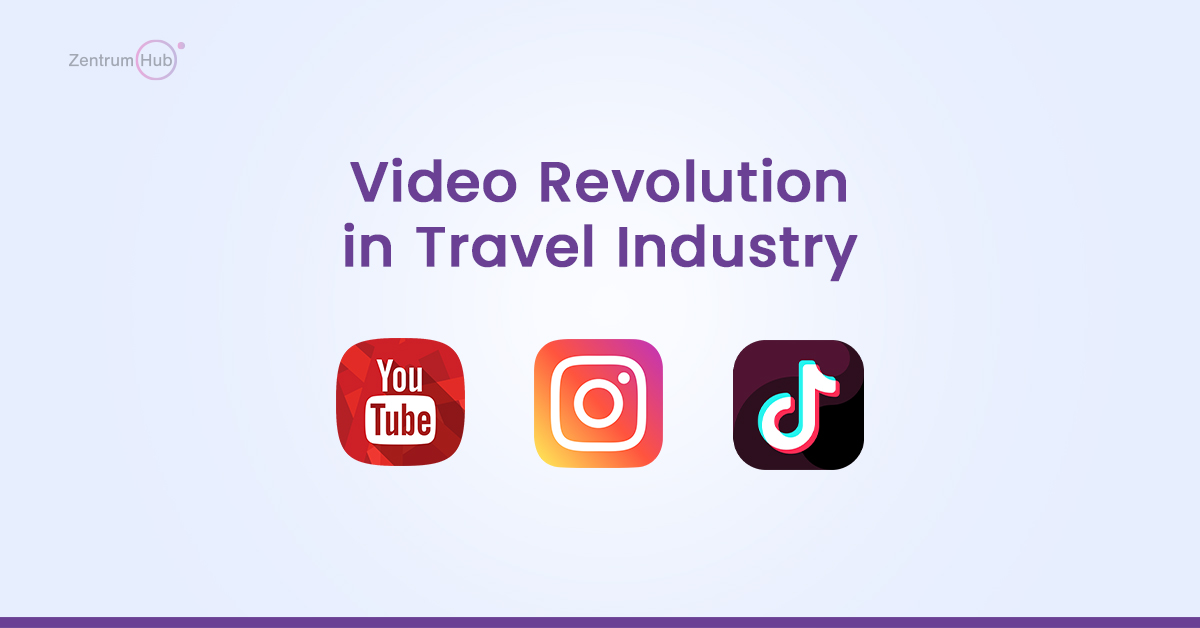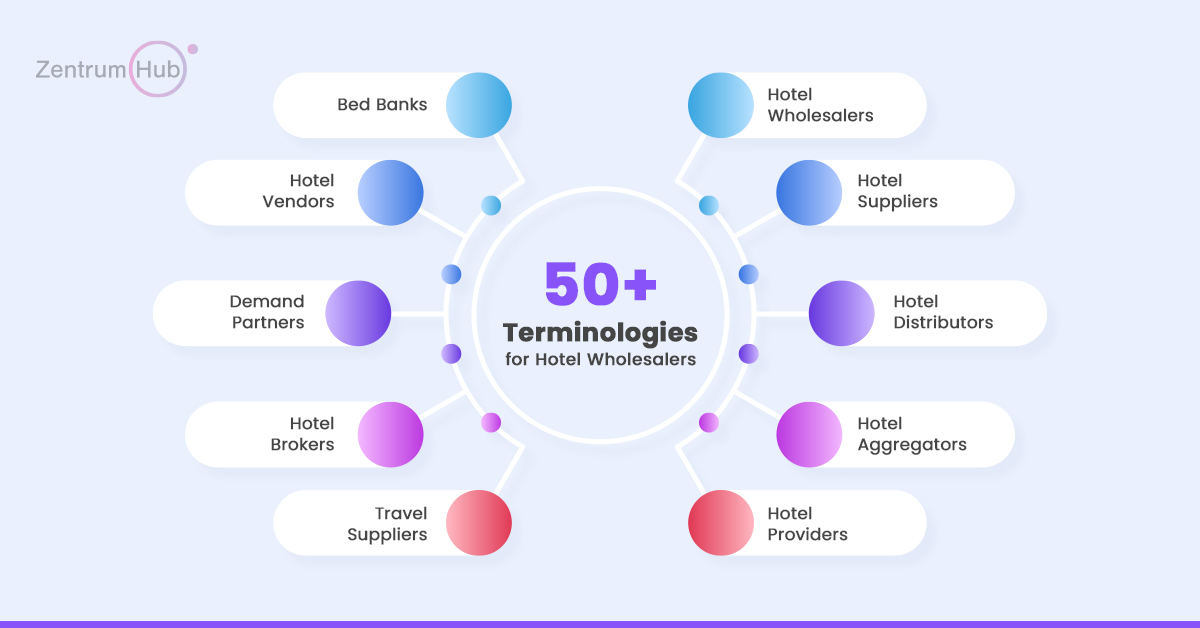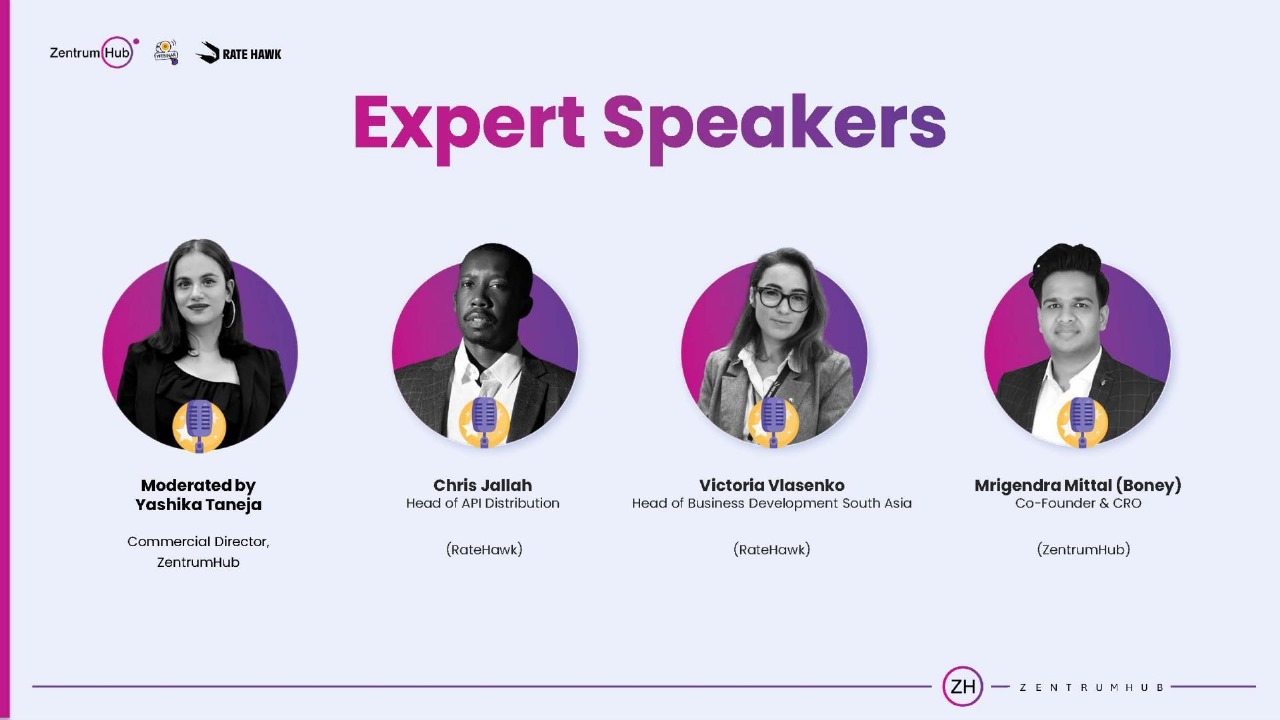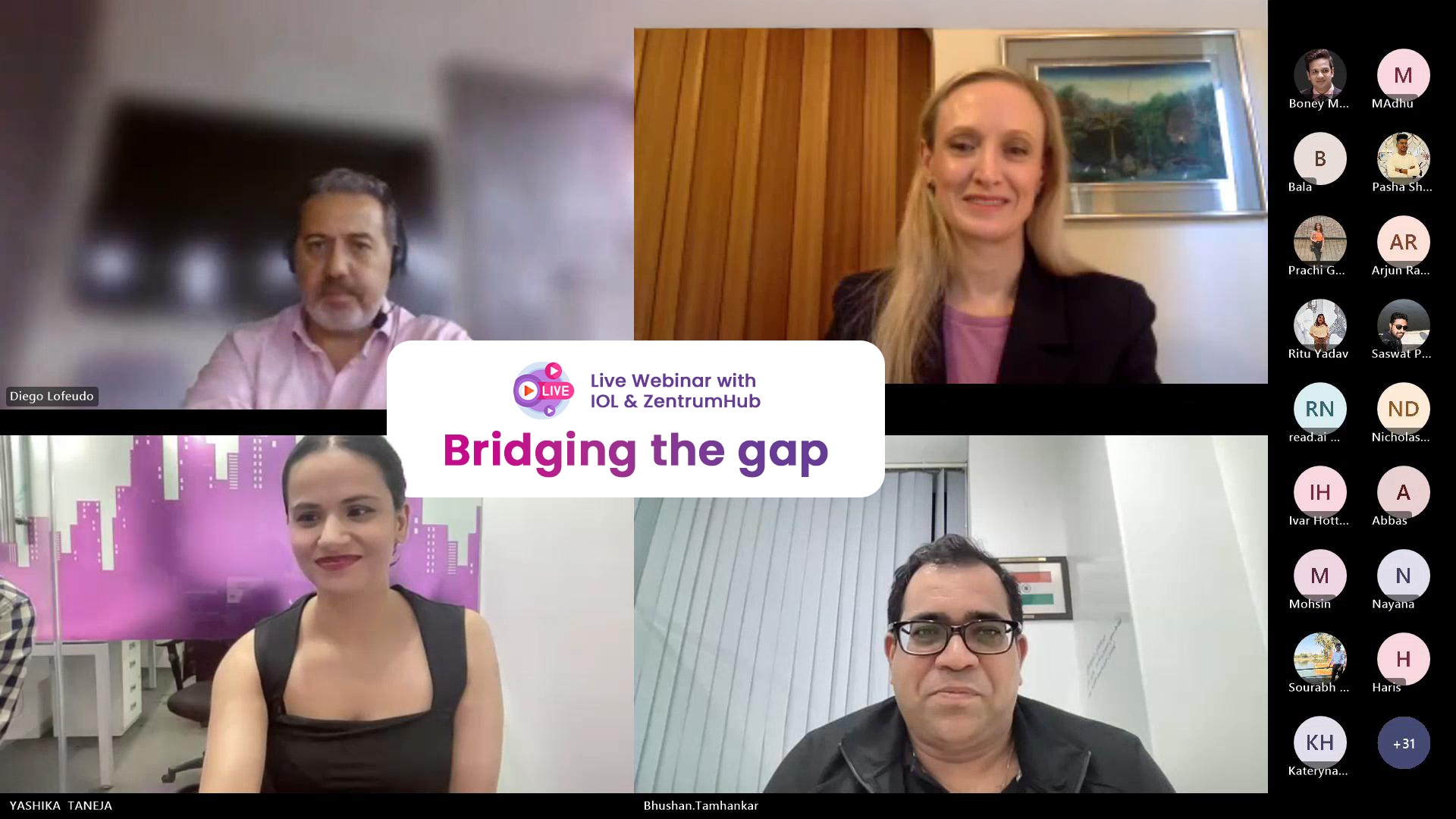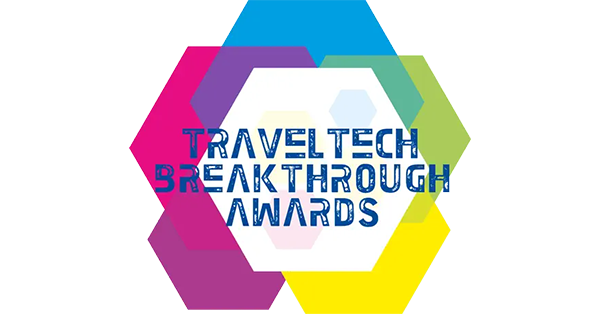- Products
Products by ZentrumHub
-
 Zentrum Booking Engine
Zentrum Booking Engine
-
 Zentrum Connect
Zentrum Connect
Zentrum Booking Engine
Fastest Hotel Booking Platform for B2B & B2C Customers
B2B – Features
- Ready to integrate 80+ hotel suppliers
- Quick agency and agent onboarding, enabling direct bookings
- Set custom markup, discounts, and commissions
- Integrated hotel, room mapping, & currency mapping
B2C – Features
- Establish your B2C brand in the travel industry
- Supplier management, search patterns, multi-currency support
- White Label solution to make personalized interface
- Multiculture & Currency standardization
- Powerful data insights to take business decisions
Zentrum Connect
Global Hotel Supplier Connectivity
- Get connected with 80+ suppliers, GDS, bedbanks and channel managers
- Multi point of sales to access public, CUG, corporate and netRates
- Pre-certified and optimized Supplier integration
- Flexible pricing options, including per-connector and usage-based models
-
- Integrated Suppliers
Get to know Pre-Integrated 75+ Hotel Suppliers with ZentrumHub
- ZentrumHub
- Insights
Insights by ZentrumHub
- Case Studies
- Press & Media
- Blog
- Events
- Webinar
- Awards
- Products
Products by ZentrumHub
-
 Zentrum Booking Engine
Zentrum Booking Engine
-
 Zentrum Connect
Zentrum Connect
Zentrum Booking Engine
Fastest Hotel Booking Platform for B2B & B2C Customers
B2B – Features
- Ready to integrate 80+ hotel suppliers
- Quick agency and agent onboarding, enabling direct bookings
- Set custom markup, discounts, and commissions
- Integrated hotel, room mapping, & currency mapping
B2C – Features
- Establish your B2C brand in the travel industry
- Supplier management, search patterns, multi-currency support
- White Label solution to make personalized interface
- Multiculture & Currency standardization
- Powerful data insights to take business decisions
Zentrum Connect
Global Hotel Supplier Connectivity
- Get connected with 80+ suppliers, GDS, bedbanks and channel managers
- Multi point of sales to access public, CUG, corporate and netRates
- Pre-certified and optimized Supplier integration
- Flexible pricing options, including per-connector and usage-based models
-
- Integrated Suppliers
Get to know Pre-Integrated 75+ Hotel Suppliers with ZentrumHub
- ZentrumHub
- Insights
Insights by ZentrumHub
- Case Studies
- Press & Media
- Blog
- Events
- Webinar
- Awards
How 27% of Gen Z Discovers Destinations Through TikTok, Instagram Reels & YouTube Shorts
Abhinav Sinha
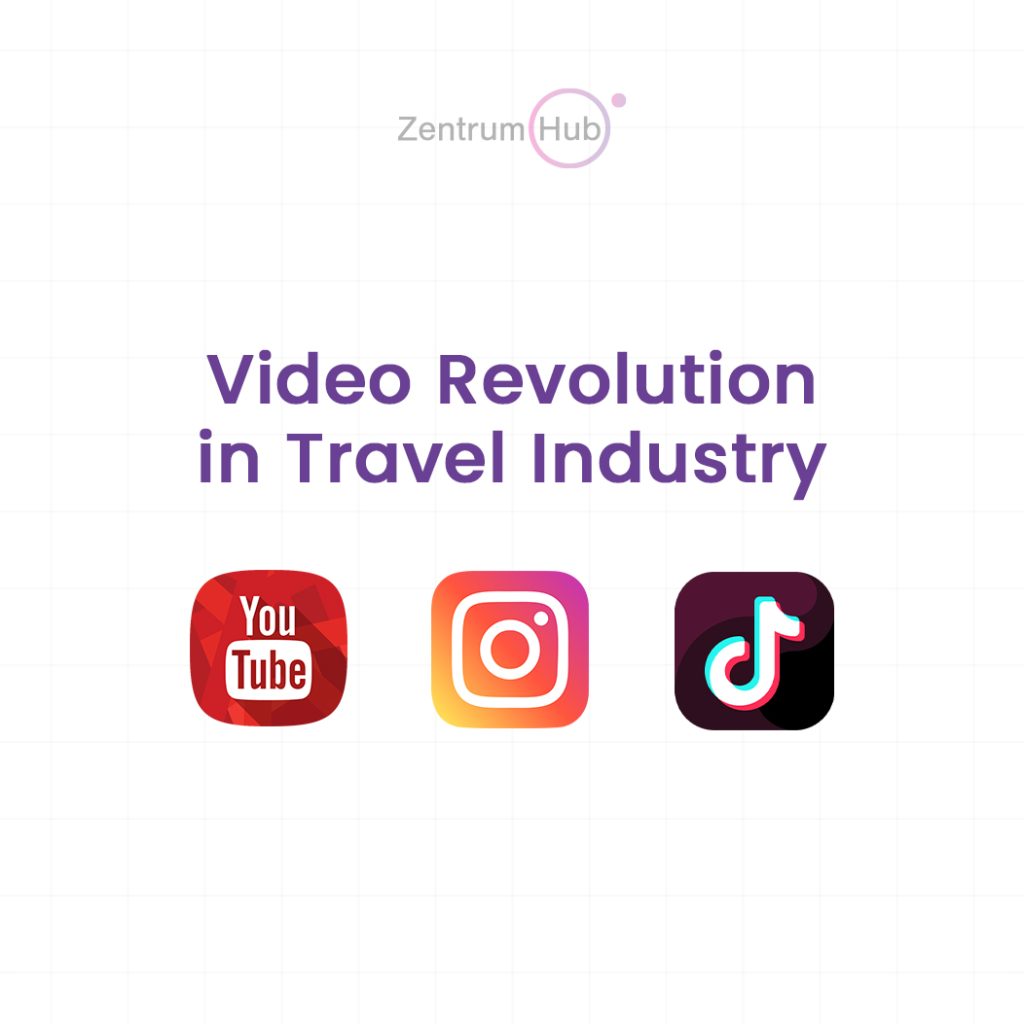
Picture this: A 22-year-old scrolls through TikTok during her lunch break and stumbles upon a 30-second video of someone hiking through misty mountains in New Zealand. The creator’s genuine excitement, the breathtaking sunrise, and that perfect trending audio create an instant spark. Within hours, she’s not just dreaming about New Zealand—she’s booking her flight.
This isn’t a hypothetical scenario. It’s happening millions of times every day, fundamentally reshaping how the travel industry operates. Welcome to the viral video revolution, where a single TikTok can generate more bookings than a million-dollar advertising campaign.
The Numbers Don't Lie: Video Content is Dominating Travel Discovery
The statistics paint a clear picture of this seismic shift transforming travel marketing:
- 27% of Gen Z uses Instagram for travel inspiration, while 17% cite TikTok as their primary source
- More than 75% of people now go on social media to search for travel inspiration
- Video content now accounts for 82% of all internet traffic, with short-form videos driving 2.5x more engagement than static posts
- TikTok has seen a 410% increase in travel content views since 2021, with 71% of European users likely to book based on TikTok recommendations
Perhaps most tellingly, industry experts note that “TikTok is going beyond social media, it’s a search engine now… They’re eating part of Google’s pie in some way, social media is going to keep influencing more and more purchase decision making.”
The $600 Billion Digital Revolution in Travel
The global online travel market was valued at $600.5 billion in 2023 and is expected to grow at around 7% CAGR through 2032. Within this massive market, OTAs now capture 40% of the global travel market, dominating online bookings worldwide.
But here’s where it gets interesting for OTAs: the competitive landscape is intensifying rapidly. The four largest OTAs—Expedia Group, Booking Holdings, Airbnb, and Trip.com Group—spent $17.8 billion on sales and marketing in 2024, up $1 billion from 2023. This escalating investment reflects one critical truth: capturing attention in our digital world has never been more expensive or more crucial.
The Mobile-First, Video-First Reality We Can't Ignore
The shift to mobile-first, video-first consumption isn’t coming—it’s here:
- 62% of online bookings now happen on phones as travel apps become the preferred booking method
- Social media users watch an average of 2.5 hours of video content daily, with short-form videos making up 67% of all social media consumption
Think about your own behavior. When did you last plan a trip by opening a laptop and systematically researching destinations? More likely, you’ve found yourself inspired by a random Instagram Reel or YouTube Short that made you think, “I need to go there.”
Read Also 10 Must-Have Features for B2B Travel Software in 2025
Why the Traditional Marketing Funnel is Completely Broken
The old marketing playbook—awareness → consideration → decision → booking—assumes people follow a logical, linear path. But social media has shattered this assumption.
TikTok users don’t always start at the top of the funnel because viral content creates instant demand. A single video can take someone from never having heard of a destination to actively searching for flights within minutes. This compressed decision-making process means 36% of new travel app users convert within a week of onboarding.
Consider how this plays out in real life:
- Traditional Funnel: See ad → research destination → compare options → read reviews → book (timeline: weeks/months)
- Viral Video Funnel: See TikTo
The Compelling Business Case: Video Marketing ROI That Can't Be Ignored
The return on investment for video marketing in travel is staggering:
- When consumers are ready to purchase on social media, TikTok ranks second at 36%, followed by Instagram at 29%
- User-generated video content drives nearly 9x more engagement than branded content
- 86% of all consumers make at least one influencer-driven purchase annually
- Companies using real-time data achieve 5-8x higher ROI than those relying on traditional methods
But here’s what makes these numbers even more compelling: video content doesn’t just drive engagement—it drives actual bookings. Travel brands report that customers who discover them through video content have higher lifetime values and lower acquisition costs compared to traditional channels.
Platform-Specific Strategies: Understanding the Unique DNA of Each Platform
TikTok: The Informal Discovery Engine
TikTok has revolutionized travel discovery with its authentic, unfiltered approach. As industry experts note: “TikTok is going to be much more informal. You don’t need to be perfect, you just need to be fun. As a company you shouldn’t be striving for the perfect video spot, do something fresh, something that is relevant with the audience.”
What Works on TikTok:
- Keep videos concise, ideally 20-30 seconds to cater to short attention spans
- Focus on trending sounds and hashtags that tap into current conversations
- Authenticity over production value—shaky camera work often performs better than professional footage
- Hashtags like #luxurytravel and #travelgoals consistently drive high engagement for travel brands
Real Example: A travel creator’s spontaneous video about finding a hidden beach in Portugal went viral with 2.3 million views. Local hotels saw a 300% increase in booking inquiries within 48 hours, with guests specifically mentioning the TikTok video when making reservations.
Instagram Reels: Visual Storytelling Excellence
Instagram remains the platform for polished visual content that inspires wanderlust. For the third year in a row, Reels outperformed other post types for travel brands, combining Instagram’s visual strength with the engagement power of short-form video.
Instagram’s Sweet Spot:
- Aspirational content that makes viewers dream
- Behind-the-scenes glimpses of destinations and experiences
- User-generated content that provides social proof
- Story features that create urgency and FOMO
Read Also What is a Hotel Channel Manager and How Does it Work?
YouTube Shorts: Educational Quick-Hits
YouTube Shorts leverage the platform’s massive reach and search functionality, offering opportunities for educational travel content in digestible formats. Think “5 Things You Must Know Before Visiting Japan” or “How to Pack for a Week in One Carry-On.”
Understanding What Gen Z Actually Wants: The Content That Converts
Modern travelers, particularly Gen Z, seek fundamentally different experiences than previous generations:
Set Jetting: The Pop Culture Connection
8% of Gen Z actively seeks movie and TV filming locations. The success of shows like “Emily in Paris” driving tourism to France or “Squid Game” boosting South Korea travel demonstrates this trend’s power.
Gig Tripping: Experience Over Sightseeing
48% of young travelers prioritize events and festivals over traditional sightseeing. They’re not just visiting Paris—they’re going to Paris for a specific concert, festival, or cultural event.
The Death of Instagram-Perfect Travel
Perhaps most surprisingly, Gen Z’s obsession with ‘Instagram-able’ travel spots is fading in 2025, with more focus on authentic, real experiences. This shift represents a massive opportunity for destinations and experiences that might not be traditionally “photogenic” but offer genuine cultural immersion.
The Psychology Behind Viral Travel Content: Why Videos Work Where Traditional Ads Fail
Understanding why video content works requires diving into human psychology:
Emotional Connection Over Information
Traditional travel advertising focuses on features: “Beautiful beaches! Five-star hotels! Great weather!” Video content focuses on feelings: the joy of discovery, the thrill of adventure, the peace of escape.
Social Proof in Action
When viewers see real people genuinely enjoying a destination, it’s more persuasive than any professional advertisement. User-generated content provides authentic social proof that traditional marketing simply cannot replicate.
The Power of Storytelling
Videos tell stories in ways that photos and text cannot. A 30-second TikTok can convey the journey from arrival to departure, creating a complete narrative that viewers can imagine themselves experiencing.
FOMO and Urgency
Viral content creates a sense that “everyone” is talking about a destination, generating fear of missing out that drives immediate action.
How Viral Content Translates to Actual Bookings: The Conversion Mechanism
The path from viral video to booking isn’t magic—it’s psychology and technology working together:
The Inspiration Spark
A compelling video creates an emotional reaction that traditional advertising rarely achieves. Viewers don’t just see a destination; they feel what it would be like to be there.
The Research Phase
After the initial emotional trigger, viewers typically spend 15-30 minutes researching the destination, looking up hotels, flights, and activities. This is where OTAs can capture demand if they’re prepared.
The Booking Decision
If the research phase goes smoothly—with easy-to-find information, competitive prices, and positive reviews—the booking often happens within hours of the initial video discovery.
The Sharing Cycle
Travelers who book based on viral content often create their own content, perpetuating the cycle and creating additional organic marketing for destinations and OTAs.
Real-World Success Stories: When Viral Videos Drive Massive Booking Spikes
The Iceland Phenomenon
Iceland’s tourism boom largely resulted from viral social media content. Videos of the Northern Lights, dramatic landscapes, and unique experiences drove visitor numbers from 300,000 in 2010 to over 2 million by 2018.
Dubai’s TikTok Strategy
Dubai’s tourism board embraced TikTok early, working with creators to showcase everything from luxury experiences to hidden local gems. The result: Dubai became one of the most hashtagged cities on TikTok, directly correlating with increased tourism and hotel bookings.
The Unexpected Destinations
Places like the Faroe Islands and Slovenia saw massive tourism increases after viral videos showcased their natural beauty, proving that any destination can benefit from the right viral moment.
The Technical Infrastructure Challenge: Why Many OTAs Are Missing Out
Here’s a reality many OTAs face: their technology can’t handle viral success. When a destination goes viral and drives thousands of simultaneous searches and bookings, many platforms crash or perform poorly, losing potential customers at the crucial moment.
Key Technical Requirements:
- Sub-second response times to match social media user expectations
- Mobile-optimized booking flows that work seamlessly on phones
- Real-time inventory management to avoid disappointing viral traffic
- Scalable infrastructure that can handle unpredictable traffic spikes
The Creator Economy: Building Authentic Partnerships
The most successful travel brands aren’t just posting their own content—they’re building genuine relationships with content creators:
Micro-Influencer Power
Creators with 10,000-100,000 followers often have higher engagement rates and more authentic connections with their audiences than mega-influencers.
Long-Term Relationships
Rather than one-off sponsored posts, successful brands build ongoing relationships with creators who genuinely love travel and can authentically represent destinations.
User-Generated Content Campaigns
Encouraging customers to create their own content provides authentic social proof while reducing content creation costs.
Looking Ahead: The Future of Video in Travel Marketing
Several trends will shape the future of video travel marketing:
Interactive Video Experiences
Technologies allowing viewers to choose their own adventure within videos, selecting different aspects of destinations to explore.
AI-Generated Personalized Content
Custom videos created for individual travelers based on their preferences and past behavior.
Virtual Reality Integration
34% of global travelers express interest in using VR to tour hotels before booking, indicating massive potential for immersive video content.
Live Shopping Events
Real-time booking during live-streamed travel content, combining entertainment with immediate purchase opportunities.
Getting Started: A Practical Framework for OTAs
Phase 1: Content Strategy Development
- Audit existing content to understand current performance
- Identify key destinations and experiences that translate well to video
- Research trending hashtags and sounds relevant to travel
- Develop content themes that align with brand values and customer interests
Phase 2: Creator Partnership Program
- Identify potential creator partners whose audiences align with target customers
- Develop partnership frameworks that benefit both parties
- Create content guidelines that maintain brand consistency while allowing creative freedom
- Establish measurement criteria for partnership success
Phase 3: Platform Optimization
- Optimize booking flows for mobile users coming from social media
- Implement tracking systems to measure video content ROI
- Develop rapid response capabilities for viral content opportunities
- Create customer support protocols for social media-driven inquiries
Phase 4: Measurement and Optimization
- Track engagement metrics across all video platforms
- Monitor booking attribution from video content
- Analyze customer lifetime value of video-acquired customers
- Continuously optimize based on performance data
The Competitive Reality: First-Mover Advantage is Disappearing
While video marketing in travel is still relatively new, the window for competitive advantage is narrowing. Early adopters are already seeing significant returns, while late adopters risk being left behind as video becomes table stakes rather than a differentiator.
Current Market Reality:
- Pioneer brands (2020-2022) established strong creator relationships and optimized systems
- Early majority (2023-2024) are implementing video strategies and seeing good results
- Late majority (2025-2026) will face higher costs and more competition
- Laggards (2027+) will struggle to compete effectively
Measuring Success: KPIs That Actually Matter
Traditional marketing metrics often don’t capture the full impact of video content. Here are the metrics that truly matter:
Engagement Metrics
- View-through rates on video content
- Comment sentiment analysis to understand emotional response
- Share rates indicating content virality potential
- Save rates showing intent to act on content later
Conversion Metrics
- Video-to-booking attribution across different timeframes
- Customer acquisition cost from video channels
- Lifetime value of video-acquired customers
- Booking velocity (time from video view to booking)
Brand Metrics
- Brand awareness in target demographics
- Share of voice in travel conversations
- Sentiment analysis of brand mentions in video comments
- Creator partnership performance and relationship quality
The Competitive Reality: First-Mover Advantage is Disappearing
As the travel industry transforms through viral video marketing, your booking engine needs to keep pace with changing customer expectations. When travelers discover destinations through TikTok videos and decide to book within minutes, your technology infrastructure becomes the critical factor determining whether you capture or lose that demand.
At ZentrumHub, we understand the evolving needs of OTAs in today’s fast-paced, video-driven market. Our AI-enabled booking engine and customized solutions are designed to handle the instant demand spikes that viral content creates, ensuring your platform delivers the sub-second response times and seamless mobile experiences that social media users expect. With real-time inventory management, scalable infrastructure, and intelligent analytics, ZentrumHub empowers OTAs to capitalize on the viral video revolution and drive sustainable business growth.
Conclusion
The viral video revolution isn’t coming—it’s here. With 27% of Gen Z discovering destinations through TikTok, Instagram Reels, and YouTube Shorts, OTAs face a simple choice: embrace video-first marketing or watch competitors capture the next generation of travelers. The brands that act now will build sustainable advantages in the $600 billion travel market, while those that wait will find themselves competing for increasingly expensive traditional advertising space as their customers book elsewhere.
Recommended Blogs
- The Numbers Don't Lie: Video Content is Dominating Travel Discovery
- The $600 Billion Digital Revolution in Travel
- The Mobile-First, Video-First Reality We Can't Ignore
- Why the Traditional Marketing Funnel is Completely Broken
- The Compelling Business Case: Video Marketing ROI That Can't Be Ignored
- Platform-Specific Strategies: Understanding the Unique DNA of Each Platform
- Instagram Reels: Visual Storytelling Excellence
- YouTube Shorts: Educational Quick-Hits
- Real-World Success Stories: When Viral Videos Drive Massive Booking Spikes
- Getting Started: A Practical Framework for OTAs
- The Competitive Reality: First-Mover Advantage is Disappearing
- The Competitive Reality: First-Mover Advantage is Disappearing
- Conclusion
- Recommended Blogs

